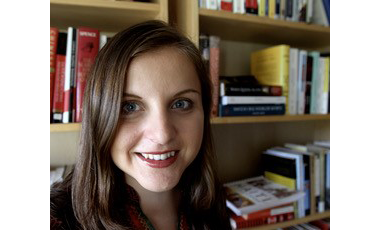Editor Q&A: Meet Valentina Pasquali – Financial Crime and AML Is Her “Beat”
October 23rd, 2017

Valentina Pasquali, ACAMS moneylaundering.com, will be speaking at NICE Actimize’s “Meet the Press” industry panel at its upcoming ENGAGE Client Forum on November 8. We met with Valentina “virtually” ahead of the event to get her thoughts on her forecasts for 2018 in anti-money laundering and financial crime trends, along with a profile of what types of stories she likes to follow in her editorial pursuits.
Q. NICE Actimize: What is your forecast in terms of key trends for 2018 in your respective areas? What do you think is top of mind for BSA officers?
A:Pasquali: The implementation of FinCEN’s new customer due diligence rule is at the top of the list for BSA/AML officers. The rule takes effect in May 2018 and financial institutions’ development of the necessary policies, procedures and controls appears to be all over the map, with some close to completion and others that haven’t even started yet. Confusion remains over the difference between the equity and control prongs, how far along the chain of ownership personally identifying information must be collected for legal entity clients and whether the 25% ownership threshold is a floor or a ceiling in the minds of regulators. More guidance is expected from FinCEN, the banking agencies and FINRA in the next few months.
The New York DFS’ new transaction monitoring certification requirement similarly still warrants consideration. The first batch of compliance certifications, whether they are filed by compliance officers, boards of directors or other senior managers, are due in April 2018, and I think compliance professionals should pay strict attention to how those certifications are then used by the state regulator. The worst case scenario would see them being used to develop cases against individual bank employees, including individual compliance officers, for mistakes that may or may not have been under their control to prevent.
Cybersecurity is also likely to remain a top priority, in light of frequent corporate data breaches, like Equifax’s, and hacks targeted specifically against the financial system, as we’ve seen in the case of the Bangladeshi central bank. FinCEN issued guidance last year urging covered entities’ AML departments to provide certain IT information when filing a suspicious activity report, raising the specter of a new regulatory expectation. To complicate matters further, many financial institutions continue to handle cybersecurity and financial crime like separate siloes and communication between the two is sometime lacking.
Finally, Congress and the Trump Administration in recent months have been very active on the sanctions front and are expected to remain so next year: OFAC added and removed hundreds of individuals and entities to its SDN list; more sanctions authorities have been put in place for Russia, North Korea and Venezuela; others have been lifted, such as in the case of Sudan; and a gradual rollback of sanctions relief for Cuba is underway, with a similar approach increasingly likely for Iran too. This means a lot of work and constant adjustments for sanctions compliance officers.
Q. NICE Actimize: What are your publication’s hottest topics right now? What do you think your readers care about the most. Are you shifting your editorial focus next year in any way?
A:Pasquali: We recently reported that criminal and civil investigations and prosecutions of individual BSA/AML compliance officers are on the rise as a result, among other things, of the September 2015 Yates memo on individual accountability.
You can imagine our readers are very keen to learn about the outcome of these probes, which we understand to be at various stages of development, and whether the Department of Justice will end up announcing criminal charges against anyone. That will in part depend on whether the department’s new political leadership decides in any way to tweak the Yates memo.
We are also covering ever more closely the rise of international standards, which in some cases, including ultimate beneficial ownership, surpass those originating in the U.S. As a result we are expanding international coverage, both in terms of our publication and our conferences, to capture that trend.
Q. NICE Actimize: What types of stories do you each like to cover the most, and why? What gets you excited to start typing?
A:Pasquali: I most enjoy writing about financial crime schemes, for example by covering ongoing prosecutions or by talking to law enforcement officials. That gives me, and I hope my readers, the true measure of the challenge at hand and of the sophistication of certain criminal enterprises and their professional money launderers. I think it also puts regulation in context, making it easier to understand why we have the rules we have and what they are there for.
Increasingly there is talk in the industry about tailoring the work of AML departments ever more closely to the needs of law enforcement, rather than engaging them in a what at times can feel like a box-checking exercise. Our coverage of financial crime schemes can hopefully help in that sense too.
Q. NICE Actimize: Final thoughts, Valentina?
A:Pasquali: Though as a publication we cover anti-bribery issues (FCPA & Kleptocracy) closely only when the corrupt proceeds travel through financial institutions, it is worth mentioning that several massive cross-jurisdictional graft probes are underway across the world, from Malaysia to Argentina, from Uzbekistan to Brazil. The funds regularly move through, sometime complicit, global lenders and are often directed to the U.S. market, where luxury real estate, art, and vehicles are perceived as safe assets.
Federal prosecutors have been doing great work in tracing and seizing the money. As a result of its 2016 real estate geographic targeting order, or GTO, and its expansion over the summer to cover wire transfers, FinCEN has an increasingly important role to play in U.S. efforts to combat international corruption.
Thank you, Valentina. We look forward to learning more from you at the 2017 ENGAGE Client Forum.




